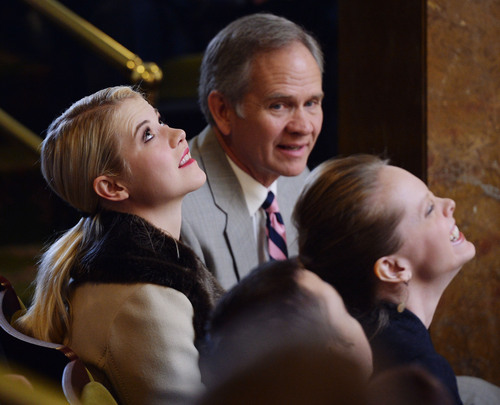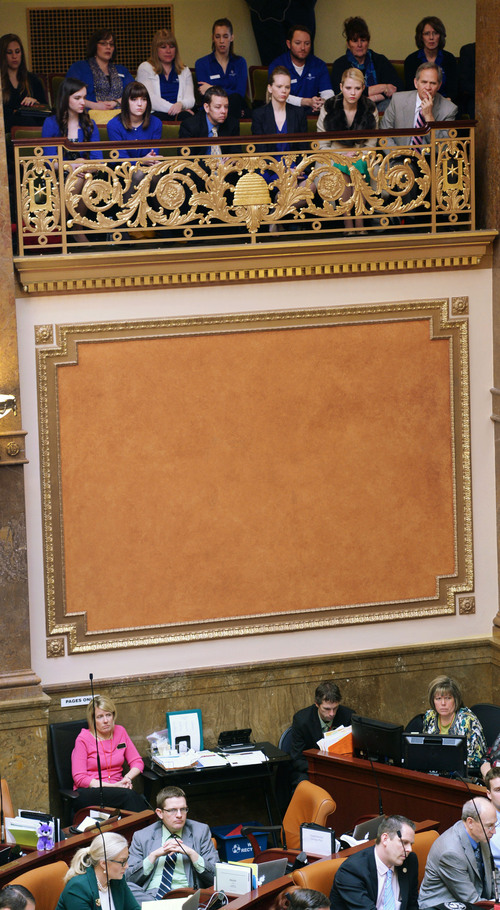This is an archived article that was published on sltrib.com in 2014, and information in the article may be outdated. It is provided only for personal research purposes and may not be reprinted.
IV. Hide your face and weep if you dare to harm a child.
— The Ten Commandments (revised, 2010, by Christopher Hitchens, RIP)
I am probably not the only newspaper reporter who has a story about a colleague who would go back to the car and pout if you dared refer to him as "my photographer."
He was not anyone's chattel property, thank you very much, and deeply resented being referred to in a way that sounded like you were comparing him to "my car." No amount of explaining that you meant it not as ownership, but as association, as in "my hometown," would assuage the perception of insult.
Artists.
There are, of course, other examples of the first person possessive pronoun causing problems, some of them much more serious. The original Ten Commandments have been faulted, and not only by the much missed writer referenced above, for equating, in that bit with all the coveting, a human being (thy neighbor's wife) with livestock (thy neighbor's ox).
The misapplication of the language most on display during the just-ended session of the Utah Legislature was the phrase, "my child." And not in the gentle terms-of-endearment sense that it might be used by a priest, or an old Time Lord.
Every time someone in the Legislature wants to help the most vulnerable among us, somebody else will run to the battlements in defense of the idea that parents are the only ones who should be making any decisions concerning "their" children.
"Theirs," as in a state of ownership. Property rights. This was the idea behind attempts to sink such bills as the one that hopefully will scare up private money to provide real educational programs at the pre-school level, and the one that will set Utah on a path to provide children with information that can help young people recognize, avoid and report incidents of sexual abuse. Including those — especially those — perpetrated by their parents or other relatives.
Both were opposed as some kind of wrongful interference with parents' unfettered authority over their children. Opposition based on the single most disgusting combination of words in the English language: "Parental rights."
Parents don't have rights. Parents have responsibilities. Duties. Burdens. The most important job in the world.
In order to do that job, parents need considerable latitude to act based on their unique knowledge of each child's needs, abilities, propensities and shortcomings, exercised through the natural bonds of affection that are necessary to give parents the patience, and children the desire, to get it right. Not because the parents have a right, but because the children have a need.
Parents throughout history have wisely taken advantage of whatever support system was available. For centuries, it was the natural structure of the extended family, clan or tribe. You know, the village it takes to raise a child. Since the modern world has destroyed those bulwarks of child raising, that activity now depends on more formal, if sometimes inferior, substitutes such as schools and recreation departments.
It is appropriate that the idealized image of two parents handling that job alone has become known as the "nuclear family." Appropriate because such a structure, all by itself, is liable to blow up, with tragic consequences.
The fear of child welfare workers storming into your home and seizing your children because you fed them burnt toast is horrifying, and used to frighten good people into opposing proper child welfare legislation, but almost always groundless.
State action to break up families is unwise and cruel in all but the most serious cases of abuse or neglect, not because parents are never wrong, but because the natural bond between parent and child is so vital that to break it for any but the most serious reason would undermine a child's sense of security so violently as to be unconscionable.
No parent gives their children everything they will need. The larger culture, sometimes in the form of government, has a role to play. To pretend otherwise is not parenting, but childish.
George Pyle, a Tribune editorial writer, had no right to expect his two sons to turn out as well as they apparently have. So far.
Twitter: @debatestate





